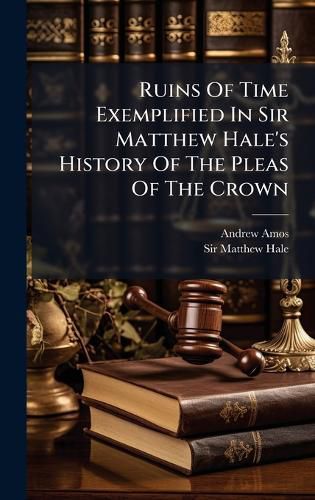Readings Newsletter
Become a Readings Member to make your shopping experience even easier.
Sign in or sign up for free!
You’re not far away from qualifying for FREE standard shipping within Australia
You’ve qualified for FREE standard shipping within Australia
The cart is loading…






Explore the enduring legacy of Sir Matthew Hale's monumental work, 'History of the Pleas of the Crown, ' through the insightful analysis of Andrew Amos. This volume delves into the historical significance and lasting impact of Hale's contributions to English criminal law. Amos masterfully elucidates the core principles and philosophical underpinnings of Hale's treatise, revealing its influence on subsequent legal thought and practice.
Discover how Hale's meticulous examination of historical precedents shaped the development of legal doctrines and continues to inform contemporary legal discourse. 'Ruins Of Time Exemplified In Sir Matthew Hale's History Of The Pleas Of The Crown' offers a comprehensive understanding of the historical context and intellectual foundations of one of the most important works in the history of English law.
This work has been selected by scholars as being culturally important, and is part of the knowledge base of civilization as we know it. This work was reproduced from the original artifact, and remains as true to the original work as possible. Therefore, you will see the original copyright references, library stamps (as most of these works have been housed in our most important libraries around the world), and other notations in the work.
This work is in the public domain in the United States of America, and possibly other nations. Within the United States, you may freely copy and distribute this work, as no entity (individual or corporate) has a copyright on the body of the work.
As a reproduction of a historical artifact, this work may contain missing or blurred pages, poor pictures, errant marks, etc. Scholars believe, and we concur, that this work is important enough to be preserved, reproduced, and made generally available to the public. We appreciate your support of the preservation process, and thank you for being an important part of keeping this knowledge alive and relevant.
$9.00 standard shipping within Australia
FREE standard shipping within Australia for orders over $100.00
Express & International shipping calculated at checkout
Explore the enduring legacy of Sir Matthew Hale's monumental work, 'History of the Pleas of the Crown, ' through the insightful analysis of Andrew Amos. This volume delves into the historical significance and lasting impact of Hale's contributions to English criminal law. Amos masterfully elucidates the core principles and philosophical underpinnings of Hale's treatise, revealing its influence on subsequent legal thought and practice.
Discover how Hale's meticulous examination of historical precedents shaped the development of legal doctrines and continues to inform contemporary legal discourse. 'Ruins Of Time Exemplified In Sir Matthew Hale's History Of The Pleas Of The Crown' offers a comprehensive understanding of the historical context and intellectual foundations of one of the most important works in the history of English law.
This work has been selected by scholars as being culturally important, and is part of the knowledge base of civilization as we know it. This work was reproduced from the original artifact, and remains as true to the original work as possible. Therefore, you will see the original copyright references, library stamps (as most of these works have been housed in our most important libraries around the world), and other notations in the work.
This work is in the public domain in the United States of America, and possibly other nations. Within the United States, you may freely copy and distribute this work, as no entity (individual or corporate) has a copyright on the body of the work.
As a reproduction of a historical artifact, this work may contain missing or blurred pages, poor pictures, errant marks, etc. Scholars believe, and we concur, that this work is important enough to be preserved, reproduced, and made generally available to the public. We appreciate your support of the preservation process, and thank you for being an important part of keeping this knowledge alive and relevant.